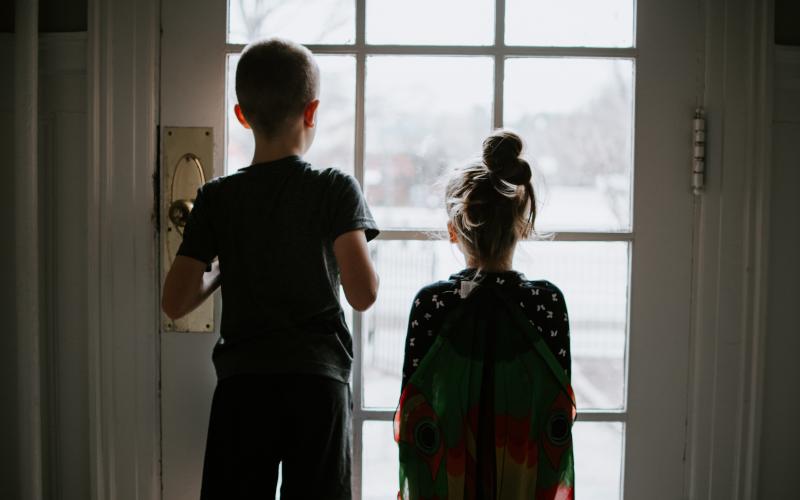
The COVID-19 pandemic has altered the lives of everyone in some way, whether it be the loss of a senior year, the loss of a job, or the devastation of losing a loved one who succumbed to the unforgiving virus.
Families are impacted by the shelter-in-place order in many ways, including incidents of domestic violence and child abuse, officials say.
Organizations and law enforcement in Rabun County are working to protect those in need during this difficult time.
Caroline Wallis, director of FAITH, Inc. (Fight Abuse in the Home), said in an email interview that the nonprofit has received calls from domestic violence victims living in fear and needing a safe place to stay while COVID-19 has forced people to stay home.
FAITH, Inc. is a 501c3 nonprofit organization that provides free and confidential services to victims of domestic violence, sexual assault, and child abuse in Northeast Georgia.
The shelter-in-place order gives abusers full control at all times, and often in domestic violence cases the abuser controls phone calls, texts and monitors emails, Wallis explained.
“Without jobs to go to during the day, victims are now walking on eggshells in their own homes 24/7, 7 days a week,” she said.
Wallis said that the shelter is currently full, but FAITH “will do what it takes to keep people safe.”
“We will not stop our services and we will find safe alternative housing for victims,” Wallis said. “Our biggest fear is the silence.”
She said there is a fear that the number of domestic violence and child abuse cases are severely underreported because victims cannot get away to call the police or FAITH’s crisis line.
This puts many victims at a difficult crossroads.
“They also have to make a very difficult decision of whether to stay in the abuse or whether to risk the outside world with the virus,” Wallis said.
Keeping children safe
Even though school is closed for the remainder of spring semester, the wellbeing of children can still be monitored.
“Children are still having regular contact with their teachers by phone, video conferencing and via Google Classroom. In that sense children still have regular access to non-relative adults, more-so even than they typically do during summer break,” said Tony Galloway, Rabun County director for Georgia Division of Family and Children Services (DFCS), in an email interview.
“Beyond that, neighbors, landlords, extended family and other community members often make reports to DFCS as well,” Galloway said.
“It is a time when neighbors need to keep their ears and eyes open if they suspect violence in a home near them,” Wallis said about how the community can contribute to the wellbeing of children.
Galloway said that the school system is one of the primary sources of those reports.
Galloway said that the current number of reported child abuse or neglect allegations is pretty much in line with what DFCS sees in the summer months when school is out.
“Right now, most of our reports are coming from medical/hospital staff or law enforcement,” Galloway said.
The Rabun County school system has School Resource Deputies (SRD’s) at each school and the main entrance to monitor surroundings and keep people safe.
Sheriff Chad Nichols said in a phone interview that these deputies are staying on campus and working even though school is out.
He said that this helps protect the employees who are still on campus working.
Nichols said that another way the deputies help is by assisting employees who are handing out food supplies and Chromebooks, because these activities often attract large groups of people.
The school closure also gives the deputies an opportunity to catch up on other work they need to complete, Nichols explained.
Combating financial hardships and food insecurities
“The increase in the financial stress many families are facing will only exacerbate domestic violence and child abuse,” Wallis said.
She said that FAITH is doing the best it can to keep the public aware that they are still open and have services that can keep families safe during shelter-in-place.
“Our advocates are able to provide services like safety planning; temporary protective orders; emergency financial, food and clothing support; emotional support; parental support and many other services by phone or through video conferencing,” Wallis said.
Galloway said that DFCS is also working to help families going through financial hardships.
“…our Office of Family Independence Staff who administer the SNAP (Supplemental Nutrition Assistance Program), Medicaid, and TANF (Temporary Assistance for needy families) programs are working overtime to process benefit renewals and new applications,” Galloway said.
Wallis said that FAITH has been trying to raise an additional $75,000 to meet the needs of safe alternative housing, food and clothing for families that are able to escape violence.
“We are always concerned about this in the summertime but with the economic hardships facing families now, we are even more concerned,” Wallis said.
The county declaring a state of emergency does not provide any additional funding to FAITH or DFCS, but both organizations are committed to helping those in the community.
“While no additional funds have been received at the county level, we’re focused on supporting foster parents and foster children by making the best use of our existing funds for this fiscal year,” Galloway said.
Protective measure for employees
The Centers for Disease Control and Prevention (CDC) has issued guidelines on safety precautions that should be utilized in order to prevent exposure to or the spread of COVID-19.
DFCS and FAITH have put policies in place to comply with these standards while continuing to serve the community.
“We have limited the one-on-one in-person meetings but we have not stopped our programs from providing the services needed to keep families safe,” Wallis said. “Thanks to a Board member, we were able to obtain the proper Personal Protective Equipment (PPE) needed for our forensic interviewer, forensic sexual abuse nurse examiner and our crisis response team members.”
She said that concerned citizens made masks for shelter residents to use.
Galloway said that DFCS continues to complete the same number of home visits as usual, but have made visits remotely using tele-conferencing when it is safe to do so.
“We’ve moved as much as possible to virtual contacts with foster children, foster parents, and the parents of children in foster care,” Galloway said.
He said that most visitation between foster children and their parents is being conducted virtually as well.
“For new investigations, the decision to go out in person versus using teleconferencing apps–in conjunction with on-scene community partners such as law enforcement and hospital social workers—is being made on a case by case basis,” Galloway said.
He said that DFCS received N-95 masks for investigators and that if they do have to go out, social distancing is practiced as much as possible.
Galloway said that while on visits, the investigator asks if anyone in the home has been sick or may have a fever and “for the sake of transparency provide the same information regarding ourselves and our households.”
“We have not changed our policies, but we are adapting our practice to use technology as often as possible to minimize our role in the spread of COVID-19,” Galloway said.
Finding help during a difficult time
Law enforcement officers in Rabun County are responding to calls reporting instances of domestic violence and child abuse.
Both the Sheriff’s Office and Clayton Police Department have reported responding to instances of domestic violence during the time the shelter-in-place order has been implemented
“We will not stop helping and will find safe places for families to stay,” Wallis said.
FAITH’s crisis line is 706-782-1338.

